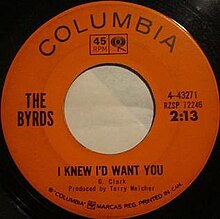
The Byrds were an American rock band formed in Los Angeles, California, in 1964. The band underwent multiple lineup changes throughout its existence, with frontman Roger McGuinn remaining the sole consistent member. Although their time as one of the most popular groups in the world only lasted for a short period in the mid-1960s, the Byrds are considered by critics to be among the most influential rock acts of their era. Their signature blend of clear harmony singing and McGuinn's jangly 12-string Rickenbacker guitar was "absorbed into the vocabulary of rock" and has continued to be influential.

"Mr. Tambourine Man" is a song written by Bob Dylan, released as the first track of the acoustic side of his March 1965 album Bringing It All Back Home. The song's popularity led to Dylan recording it live many times, and it has been included in multiple compilation albums. It has been translated into other languages and has been used or referenced in television shows, films, and books.
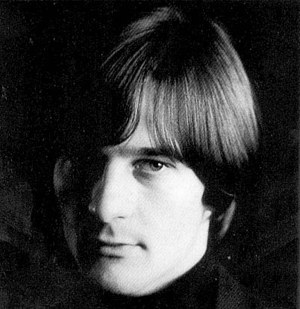
Harold Eugene Clark was an American singer-songwriter and founding member of the folk rock band the Byrds. He was the Byrds' principal songwriter between 1964 and early 1966, writing most of the band's best-known originals from this period, including "I'll Feel a Whole Lot Better", "She Don't Care About Time", "Eight Miles High" and "Set You Free This Time". Although he did not achieve commercial success as a solo artist, Clark was in the vanguard of popular music during much of his career, prefiguring developments in such disparate subgenres as psychedelic rock, baroque pop, newgrass, country rock, and alternative country. He was inducted into the Rock and Roll Hall of Fame in 1991 as a member of the Byrds.
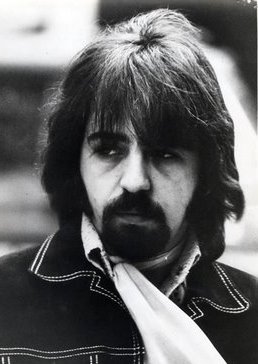
Clarence White was an American bluegrass and country guitarist and singer. He is best known as a member of the bluegrass ensemble the Kentucky Colonels and the rock band the Byrds, as well as for being a pioneer of the musical genre of country rock during the late 1960s. White also worked extensively as a session musician, appearing on recordings by the Everly Brothers, Joe Cocker, Ricky Nelson, Pat Boone, the Monkees, Randy Newman, Gene Clark, Linda Ronstadt, Arlo Guthrie, and Jackson Browne among others.
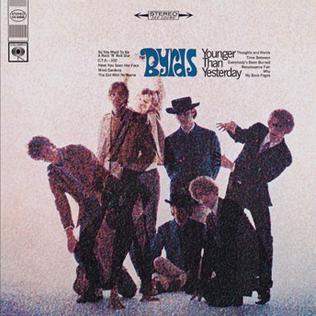
Younger Than Yesterday is the fourth studio album by the American rock band the Byrds and was released on February 6, 1967, on Columbia Records. It saw the band continuing to integrate elements of psychedelia and jazz into their music, a process they had begun on their previous album, Fifth Dimension. In addition, the album captured the band and record producer Gary Usher experimenting with new musical textures, including brass instruments, reverse tape effects and an electronic oscillator.
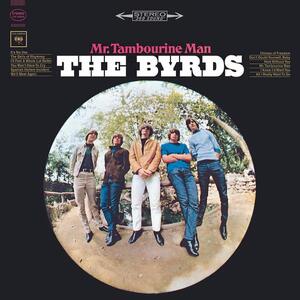
Mr. Tambourine Man is the debut studio album by the American rock band the Byrds, released on June 21, 1965, by Columbia Records. The album is characterized by the Byrds' signature sound of Jim McGuinn's 12-string Rickenbacker guitar and the band's complex harmony singing. The material on the album mostly consists of cover versions of folk songs, primarily composed by Bob Dylan, and originals written or co-written by singer Gene Clark. Along with the Dylan-penned single of the same name, Mr. Tambourine Man established the band as an internationally successful act and is widely regarded by critics as representing the first effective American challenge to the chart dominance of the Beatles and other British Invasion bands during the mid-1960s.

Fifth Dimension is the third album by the American rock band the Byrds and was released in July 1966 on Columbia Records. Most of the album was recorded following the February 1966 departure of the band's principal songwriter Gene Clark. In an attempt to compensate for Clark's absence, guitarists Jim McGuinn and David Crosby increased their songwriting output. In spite of this, the loss of Clark resulted in an album with four cover versions and an instrumental, which critics have described as "wildly uneven" and "awkward and scattered". However, it was the first Byrds album not to include any songs written by Bob Dylan, whose material had previously been a mainstay of the band's repertoire.

The Byrds' Greatest Hits is the first greatest hits album by the American rock band the Byrds and was released in August 1967 on Columbia Records. It is the top-selling album in the Byrds' catalogue and reached number 6 on the Billboard Top LPs chart, but failed to chart in the UK.
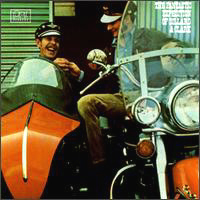
The Fantastic Expedition of Dillard & Clark is a country rock album by Dillard & Clark. A&M Records issued the album in the US in October 1968, and its release in the UK followed in July 1969. The album was recorded in 1968, shortly after Gene Clark had departed the Byrds for the second time and after Doug Dillard left the Dillards. The album is hailed by critics and musicians as a unique masterpiece at the intersection of country rock and Americana.

The Original Singles: 1965–1967, Volume 1 is a compilation album by American rock 'n' roll band the Byrds. Originally released in 1980, it offered, for the first time, all of the mono single versions of the Byrds' singles released between 1965 and early 1967. The tracks on the album are laid out chronologically by release date of the single, and features the A-side first, then the B-side. For example, the Byrds' first single was "Mr. Tambourine Man" with "I Knew I'd Want You" on the B-side. The next single was "All I Really Want to Do" with "I'll Feel a Whole Lot Better" on the B-side, and so forth.
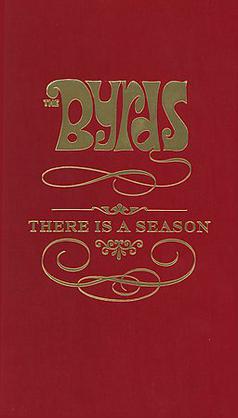
There Is a Season is a four-CD and one DVD box set by the American rock band the Byrds that was released on September 26, 2006 by Columbia/Legacy. It comprises 99 tracks and includes material from every one of the band's twelve studio albums, presented in roughly chronological order. The bonus DVD features ten clips of the Byrds lip-synching their hits on television programs between 1965 and 1967. Upon release, the box set failed to reach the Billboard 200 chart or the UK Albums Chart. There Is a Season supplants the band's earlier box set, The Byrds, which was released in October 1990.

Preflyte is a compilation album by the American folk rock band the Byrds and was released in July 1969 on Together Records. The album is a collection of demos recorded by the Byrds at World Pacific Studios in Los Angeles during late 1964, before the band had signed to Columbia Records and become famous. It includes early demo versions of the songs "Here Without You", "You Won't Have to Cry", "I Knew I'd Want You", and "Mr. Tambourine Man", all of which appeared in re-recorded form on the band's 1965 debut album.

The Byrds' Greatest Hits Volume II is the second greatest hits album by the American rock band the Byrds. It was released in the United Kingdom and Europe on October 29, 1971, by CBS Records as a follow-up to the band's first compilation album, The Byrds' Greatest Hits. The album appeared following the band's successful appearance at the Lincoln Folk Festival in England on July 24, 1971, and according to band biographer Johnny Rogan may have been issued by CBS as a reaction to the band's previous studio album, Byrdmaniax, having failed to chart in the UK.

Never Before is a compilation album by the American rock band the Byrds, consisting of previously unreleased outtakes, alternate versions, and rarities. It was initially released by Re-Flyte Records in December 1987 and was subsequently reissued on CD in 1989, with an additional seven bonus tracks.

In the Beginning is a compilation album by the American folk rock band the Byrds and was released in August 1988 by Rhino Records. It features demo recordings made during 1964, before the band became famous.

The Hillmen were a southern Californian bluegrass group. Formed in 1962, the original line-up of the Golden State Boys consisted of Vern Gosdin on guitar and lead vocals, his brother Rex Gosdin on double bass, Hal Poindexter on guitar, and Don Parmley on banjo. Poindexter left the group in late 1962, however, and was replaced by 17-year-old mandolin prodigy Chris Hillman. Hillman, who had previously been a member of the high-profile San Diego bluegrass group the Scottsville Squirrel Barkers, was invited to join the Golden State Boys by Parmley, after the pair met at a bluegrass evening at The Ice House folk club in Pasadena. Upon his recruitment, the group briefly changed their name to the Blue Diamond Boys before finally settling on The Hillmen, in honor of their mandolin playing wunderkind.

McGuinn, Clark & Hillman were an American rock group consisting of Roger McGuinn, Gene Clark, and Chris Hillman, who were all former members of the band the Byrds. The group formed in 1977 and was partly modeled after Crosby, Stills, Nash & Young and, to a lesser extent, the Eagles. They were reasonably successful commercially in the United States, with their debut album reaching number 39 on the Billboard Top LPs & Tapes chart and the single "Don't You Write Her Off" reaching number 33 on the Billboard Hot 100.

"She Don't Care About Time" is a song by American folk rock band the Byrds. It was released on a non-album single in October 1965, as the B-side to "Turn! Turn! Turn!". The song was written by Gene Clark, the Byrds' main songwriter between 1964 and early 1966. "She Don't Care About Time" was recorded during sessions for the group's second album Turn! Turn! Turn!. The song is on most of the band's hits compilations.
"Here Without You" is a song written by Gene Clark that was first performed on the Byrds' 1965 debut album Mr. Tambourine Man. It was later covered by other artists, including Reigning Sound and Richard Thompson.
"If You're Gone" is a song written by Gene Clark that was first released on the Byrds' 1965 album Turn! Turn! Turn!.
